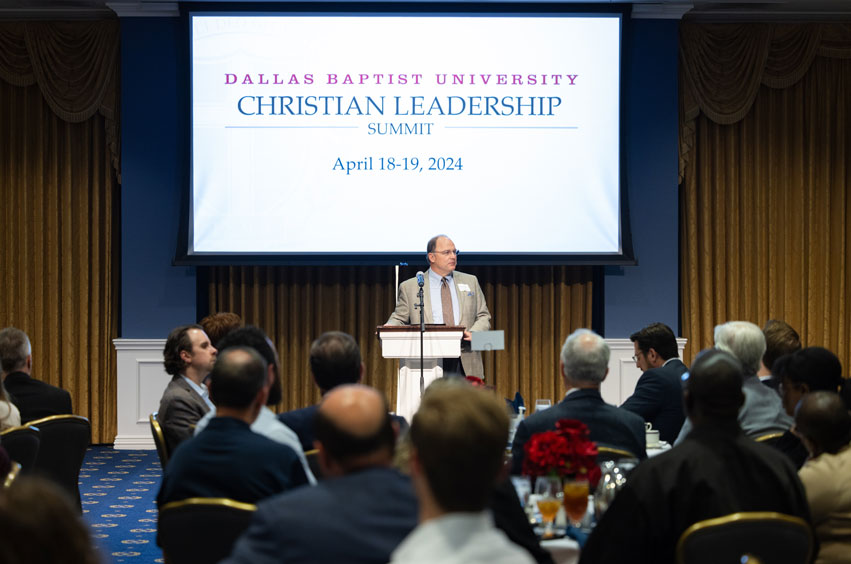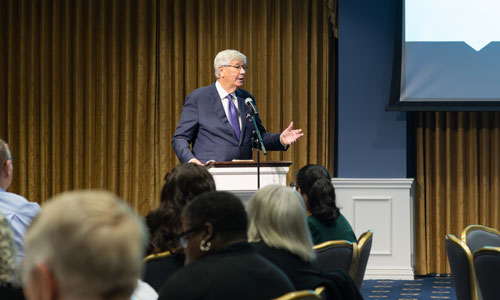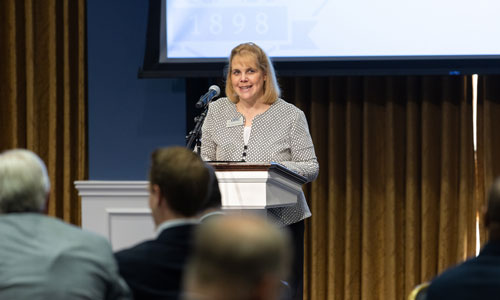The Gary Cook School of Leadership Hosts Christian Leadership Summit

The Gary Cook School of Leadership hosted the annual Christian Leadership Summit this semester. Dean of the Cook School of Leadership, Dr. Blake Killingsworth, shared his vision for this year's summit, "We want to bring together individuals who are interested in what leadership can be and combine these like-minded things that we can discuss, not only for leadership but also leadership for the sake of the Gospel and how the Christian witness changes how we lead." The event consisted of three keynote speakers, breakout sessions, and a panel discussion that featured DBU alumni and other prominent leaders in the DFW metroplex.
First Keynote Session: Raymond Harris
Raymond Harris, Senior Fellow of Entrepreneurship with the DBU Institute for Global Engagement, led the first keynote session. Raymond is the 2018 DBU Russell H. Perry Free Enterprise Award recipient and the founder of one of the largest architectural firms specializing in corporate architecture. The author of The Anatomy of a Successful Firm, The Heart of Business, and Business by Design is also an executive producer for numerous movies distributed by Sony Pictures and Lions Gate Entertainment.
Raymond titled his message "Picking the Jockeys" and attributed it to a quote from Ross Perot: "I pick the jockeys, I let the jockeys pick the horses, and then ride them." Raymond explained that leadership, in any space, is about being or picking the right jockey. As a leader, investing in the best person for the job is one of the most important things you can do. "I don't invest in what they do, but in who they are and who they'll be in God's Kingdom."
Raymond emphasized that enacting righteousness and justice from your seat in power is the most essential duty. He referenced King Solomon and how he had the opportunity to ask the Lord for anything, and he asked for wisdom. Raymond explained that you will understand righteousness and justice as wisdom floods the heart. We are called to thirst for righteousness and justice, to hunt after it. When the people in power are seeking righteousness, they will prosper.
Raymond focused on righteousness demonstrated in the Bible among "the least of these." Jesus sought after the rejected members of society throughout His ministry. The woman who donated her last two copper coins gave more than anyone else. "The righteousness of this woman was immortalized due to Jesus seeking her out and highlighting the lowest members of society." Raymond became emotional when recounting these stories because of the vulnerability of our Savior; speaking to the groups no one spoke to, knowing their righteousness would be included in the Scriptures, is so powerful.
Raymond closed by highlighting the importance of the Golden Rule, found in Matthew 7:12. "What if we entered every business negotiation and put the needs of the other guy first? What would our world look like if we were more concerned with ensuring the other side gets the best outcome?" Raymond explained that all actions should be marked with God's love. We do not have righteousness on our own, but the Lord graciously bestows it upon us. We are made righteous through Christ because of His obedience to the Father on the cross. When we seek the Lord's righteousness, our walks will be more aligned with the Holy Spirit, and so will our leadership.
Second Keynote Session: Dr. Randel Everett
The summit continued with the second keynote session, led by Dr. Randel Everett, Senior Fellow for Religious Freedom with DBU's Institute for Global Engagement. He recently joined the DBU Family after serving for the past decade as the Founding President of the 21st Century Wilberforce Initiative. Before his work with Wilberforce, Dr. Everett served in various roles in local church and denominational life. Dr. Everett is the author of Speak Freedom: Developing Emergent Leaders in the Struggle for Justice.

Dr. Everett titled his message "Apostolic Leaders for Chaordic Times." Chaordic is the combination of chaos and order, which truthfully describes the current times of the world. How are we supposed to be Christ-centered leaders amid these chaotic times where we're forced to keep trucking along like everything is normal? Dr. Everett stressed the reminder that as God's children, we are sojourners of the earth, not citizens. We are called to steward our time and resources here, but our home is ultimately in heaven.
Dr. Everett explained that the world needs apostolic leaders who engage with the global church, are willing to take risks, travel light, have a pure heart, persevere, and are single-minded on Christ. Learning from other cultures and seeing how the Lord works around the globe is paramount to becoming a godly leader. Taking risks allows the Lord to work in mysterious ways. In our world plagued by materialism, the church often gets hung up on facilities, statistics, decorations, and other things that deter focus from leading well. "We cannot be leaders in this world without the grace of Christ working in us and through us."
Final Keynote Session: Dr. Mary Nelson
The final keynote session featured Dr. Mary Nelson, Director of the Ph.D. in Leadership Studies program and Professor of English at DBU. Dr. Nelson is a two-time recipient of DBU's Piper Outstanding Professor of the Year award (2010, 2019) and has presented papers worldwide, with focused research on the intersection of literature and leadership.

Dr. Nelson titled her lecture "The Role of Empathy in Leadership." She stated that the world has seen a drastic decrease in feelings of empathy. Social media has received the brunt of the blame, and for good reason. A study measured levels of empathy in people, and the more time spent on social media revealed less feelings of empathy. Race, gender, age, location, and other factors did not affect the data. Our society is cursed with knowledge from social media, the news, and more. In some, it has caused compassion fatigue. In our world, where all the famous news stories are heartbreaking, people can simply run out of compassion. Another cause of the lack of empathy is psychic numbing. Psychic numbing is a phenomenon when a large group is suffering; it becomes easier to gloss over the tragedy due to the lack of individuality shown among the people.
But why is empathy important for leadership? Research has shown that employees perform better and have higher job satisfaction when they have an empathetic supervisor. Empathy allows you to connect with other people on a deeper level. Getting to know someone beyond their job title is essential for workplace success and for being the light of Christ.
Dr. Nelson proposes that literature could cure one's lack of empathy. Becoming immersed in a fictional world and narrative forms a bond between the reader and the characters. Fiction humanizes issues. These characters and their experiences aren't real, yet it is a human response to cry when your favorite fictional character dies in the story. Reading literature allows readers to tap into their humanity and will enable them to empathize with others. When real-life situations are similar to those experienced in fiction, our immediate response will be empathy. "I would argue that we need imagination to bridge the gap from ourselves to others." Dr. Nelson closed by encouraging the audience to broaden their tastes and read fiction out of their comfort zone because it will lead to a new perspective and renewed empathy needed to be a Christ-centered leader.
The Gary Cook School of Leadership produces servant leaders, Christian scholars, and global thinkers who lead with excellence for the glory of God and the renewal of our world in business, ministry, higher education, and other callings. The Cook School of Leadership offers master's degrees in higher education, international relations, and leadership; a Ph.D. in Leadership Studies; and an online Ed.D. in Educational Leadership. Graduates of the Cook School of Leadership receive a Christ-centered, interdisciplinary education that prepares them to lead with effectiveness and serve with humility in today’s organizations, impacting both present and future generations to come.
Cameron Billings is the Assistant Director of Media and Public Relations in University Communications at Dallas Baptist University.








